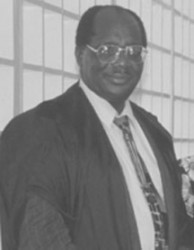The long vacant post of Ombudsman will likely be filled soon as government yesterday informed the opposition of its selection of former Justice Winston Moore to hold the position.
A main opposition spokesman yesterday said that more important than the selection of Moore is ensuring that the appointment is not a “rubber stamp position.”
“We had a consultation with the president on the appointment of an Ombudsman and they informed us that Winston Moore was selected… this is not a position where we are required any input but we don’t just want an Ombudsman to say we have one. We want a functioning one free to execute his duties,” APNU’s Joseph Harmon told Stabroek News shortly after the meeting yesterday.

According to the constitution, the Ombudsman may investigate any action taken by any department of government or by the president, ministers, officers or members of such a department or authority being action taken in exercise of the administrative function of that department or authority.
Harmon explained that since the Ombudsman is required to represent individuals where he/she finds that there is an imbalance between the citizen and the state, the opposition is hoping that government channels the necessary resources needed to make the office function effectively.
He said that both opposition parties have been pushing for the appointment of an Ombudsman for years and do not only want Justice Moore’s appointment to correct the failure to appoint an Ombudsman for over 15 years but to also be free to work according to the constitution.
“We want the Ombudsman office to have the necessary resources because this office may be handling a flurry of complaints from GPL, NIS, Public servants… if it doesn’t have the capacity then what? You just say you have an Ombudsman? That is what we are worried about,” Harmon said.
He stressed that the person appointed should have all the required resources to execute their duties according to the law, so that the complaining public may achieve redress should they seek that course of action.
The constitution states that the Ombudsman may investigate any such action as aforesaid in any of the following circumstances: If a complaint in respect of the action is duly made to the Om-budsman by any person or body of persons, whether incorporated or not, alleging that the complainant has sustained injustice in consequence of a fault in administration; if the President, a Minister or a member of the National Assembly … requests the Ombudsman to investigate the action on the ground that a person or body of persons specified in the request has or may have sustained such injustice; in any other circumstances in which the Ombudsman considers that he ought to investigate the action on the ground that some person or body of persons has or may have sustained such injustice.
The Ombudsman position was one of a clutch that transparency advocates have argued have to be filled before there is greater confidence in society that aggrieved members of the public can have a fair hearing.




